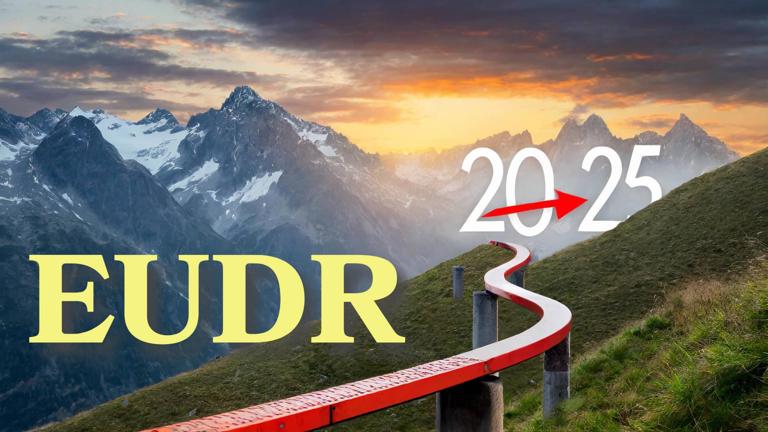The European Union adopted the groundbreaking EU Deforestation Regulation (EUDR) in 2023, a measure aimed at combating global deforestation by banning the import and export of products that contribute to deforestation. This regulation requires companies that import certain raw materials, such as soy, wood, palm oil, coffee, cocoa and rubber, take strict due diligence measures to ensure their products do not come from recently deforested land.
While the intent of the EUDR has been hailed as essential for protecting forests and combating climate change, its implementation has led to significant resistance and requests for postponement from various sectors and countries.
One of the first requests for a postponement came from the European Coffee Federation (ECF) in February 2024. The ECF warned that the current timeline of the EUDR, with full implementation scheduled for December 30, 2024, could have disastrous consequences for millions of small coffee farmers who may are unable to comply with the new regulations on time. This could significantly disrupt the coffee market and have negative economic consequences for small-scale producers.
Shortly afterwards, in March 2024, calls from the timber industry followed. Several European timber industry federations, including the French timber industry, highlighted the practical difficulties of complying with the EUDR. They pointed out that the required traceability and due diligence are challenging without additional time and resources. There were calls for the implementation of the EUDR to be postponed until the legislation is practicable.
During the same period, criticism also came from palm oil-producing countries, especially Malaysia. The Malaysian government emphasized that the EUDR in its current form is discriminatory and disadvantages small farmers. Malaysia has repeatedly called for a review of legislation to minimize the negative impact on their agricultural sector.
Meanwhile, NGOs such as ClientEarth have called on the European Commission to stick to the EUDR’s original timeline and not give in to pressure for a delay. They emphasize that compliance with the EUDR is crucial to effectively tackle deforestation and not disadvantage companies that are already investing in sustainable practices.
These requests and developments demonstrate the complexity and challenges associated with implementing the EUDR. They underline the need for a balanced approach that takes into account both the protection of forests and the economic realities of the sectors and countries involved.
Methodology
This analysis used secondary data collected from various online articles and reports published between February and May 2024. The data collected includes requests for postponement of the EUDR submitted by various sectors and countries. Key sources include:
- Articles from the European Coffee Federation (ECF) highlighting the concerns of small coffee farmers and calling for a postponement of the implementation of the EUDR.
- Reports from the Rainforest Alliance on the first EUDR compliant coffee exports and support for companies to comply with regulations.
- Publications from various European timber industry federations and the International Tropical Timber Organization (ITTO), highlighting the practical challenges and economic impact of the EUDR.
- Requests and statements from the Malaysian and Indonesian governments, criticizing the negative impact of the EUDR on small farmers and calling for a postponement and review.
The data was analyzed to identify trends and patterns in deferment requests, with a focus on sectoral and geographic differences. By following the chronological order of the publications, we have mapped the development and intensification of requests for postponement. This approach provides a structured insight into the various perspectives and challenges associated with the implementation of the EUDR.
Sectoral and geographical analysis of postponement requests
The introduction of the European Deforestation Regulation (EUDR) has led to numerous requests for a postponement from various sectors and countries. This chapter analyzes the specific sectors that have requested deferrals, as well as the geographical distribution of these requests. This analysis allows us to understand the common concerns and challenges experienced by the parties involved.
Sectoral analysis
Coffee industry
One of the first and most vocal sectors to request a postponement of the EUDR was the coffee industry. The European Coffee Federation (ECF) sent a letter to the European Commission in February 2024 warning of the disastrous consequences of the current timeline for millions of small coffee farmers. The ECF emphasizes that around 80% of coffee farmers have not yet mapped their plots, which hinders them from complying with the new regulations. The organization is calling for more time and support to meet due diligence requirements without disrupting the market.
May 2024 marked an important milestone when High Range Coffee Curing from India exported the first EUDR compliant coffee beans to Europe. The Rainforest Alliance played a crucial role in supporting the farm in meeting EUDR requirements, indicating that working with certification organizations offers a potential solution to the challenges facing the sector.
Timber industry
The timber industry has also expressed significant concerns about the practicality of the EUDR. In March 2024, several European timber industry federations, including the French timber industry, emphasized that the required traceability and due diligence are difficult to implement without additional time and resources. The federations argue for a postponement of implementation until the legislation is practicable and call for a rapid classification of low-risk countries to reduce the administrative burden.
In addition, the International Tropical Timber Organization (ITTO) has published a summary of industry responses to calls to postpone the EUDR. Several timber industry stakeholders and exporting countries have raised concerns about the feasibility and impact of the EUDR’s strict timeline. The ITTO emphasizes the need for a balanced approach that takes into account both the protection of forests and the economic realities of the countries involved.
Palm oil industry
The palm oil industry, particularly in Malaysia and Indonesia, has also criticized the EUDR. Malaysia has stressed that the current rules are discriminatory and disadvantage small farmers. The Malaysian government has repeatedly called for a review of the EUDR to minimize the negative impact on their agricultural sector. The objections mainly focus on the complexity and costs of compliance for small farmers, who struggle to meet strict traceability requirements.
These concerns were discussed in a joint task force between the EU, Malaysia and Indonesia. The task force focuses on addressing the challenges manufacturers face in complying with regulations. Malaysia and Indonesia have requested more time and support to make the necessary adjustments without jeopardizing the economic stability of smallholder farmers.
Geographic analysis
Europe
Within Europe, several countries, most notably Austria, have called for a postponement of the EUDR. Austria’s agriculture and economy ministers have asked the European Commission to delay the implementation of the EUDR, arguing that the current timeline is too short to make the necessary adjustments in the supply chain without economic damage. In addition, several European industry organisations, such as the Federation of European Forest Industries, have expressed concerns about the practical implementation of the legislation and have called for clarification and workable solutions.
South East Asia
In Southeast Asia, Malaysia and Indonesia have voiced the most criticism of the EUDR. Both countries have emphasized that the regulations in their current form disadvantage small farmers and have called for a review and delay in implementation. The Malaysian government has indicated that the current rules are discriminatory and has repeatedly requested more time and support to make the necessary adjustments. Indonesia has raised similar concerns and has advocated for fair treatment of their agricultural sectors within the context of the EUDR.
Discussion
The introduction of the EU Deforestation Regulation (EUDR) has led to significant debate and resistance from various sectors and countries. This discussion analyzes the key concerns and challenges raised in the deferral requests, with a focus on the economic impact on small producers, the complexity of compliance, and the need for adequate preparation and support.
Economic impact on small producers
An important reason for the requests for postponement is the negative economic impact on small farmers and producers. The European Coffee Federation (ECF) emphasized in February 2024 that the current EUDR timeline could have disastrous consequences for millions of small coffee farmers. About 80% of these farmers have not yet mapped their plots, which hinders them from complying with the new regulations. This could lead to significant disruptions in the coffee market and negative economic consequences for small-scale producers.
These concerns are also shared by the palm oil industry, especially in Malaysia and Indonesia. The Malaysian government has repeatedly emphasized that the EUDR in its current form is discriminatory and disadvantages small farmers. The costs and administrative burden of compliance can exclude small farmers from the European market, threatening their economic stability.
Complexity of compliance
The requirements for geolocation data and strict traceability are seen as particularly challenging by industries that work with composite or highly processed products, such as the timber industry. In March 2024, several European timber industry federations, including the French timber industry, stressed that the current timeline is not feasible without significant disruptions to supply chains and additional compliance costs.
The timber industry has pointed out that traceability and due diligence requirements are particularly difficult to implement for composite products such as plywood, panels and furniture. This requires strict traceability of the products, which can be complicated and sometimes even impossible for highly processed products. The federations therefore argue for a postponement of implementation until the legislation is practically enforceable and call for a rapid classification of low-risk countries to reduce the administrative burden.
Insufficient preparation and support
Another common concern is the feeling of insufficient preparation and support to effectively implement the EUDR. The Rainforest Alliance has highlighted that while the EUDR is an important step forward towards sustainable practices, many smallholder farmers need additional support to meet the requirements. The organization is calling on companies to support small coffee farmers instead of reducing their purchases to ensure they can meet EUDR deadlines.
The Malaysian and Indonesian governments have expressed similar concerns. A joint task force between the EU, Malaysia and Indonesia discussed how to tackle the challenges faced by producers. Both countries emphasized the need for fair treatment and requested more time and support to make the necessary adjustments without endangering the economic stability of small farmers.
Balancing environmental and economic objectives
The implementation of the EUDR challenges policy makers to find a balance between environmental and economic objectives. While the EUDR’s intention to combat deforestation is widely supported, its practical feasibility and economic impact on small producers are major concerns. ClientEarth and other NGOs have emphasized that EUDR compliance is crucial to effectively tackling deforestation and not penalizing companies already investing in sustainable practices.
In addition, there is the need to minimize the administrative and financial burden for small farmers, so that they can maintain access to the European market. This can be achieved, for example, by allowing extra time for implementation and by providing targeted support to small producers.
Conclusion
The implementation of the EU Deforestation Regulation (EUDR) is an important step in the global fight against deforestation. While the intent and objectives of the legislation are widely supported, its introduction has raised significant concerns and requests for delays from various sectors and countries. These requests highlight the complexities and challenges associated with complying with the new regulations.
Based on the requests analyzed and the underlying reasons, several recommendations can be made to facilitate the implementation of the EUDR and address the concerns of the sectors and countries concerned:
- Delay of implementation: Consider a phased implementation of the EUDR to give companies and countries more time to adapt to the new regulations. This can help minimize the economic impact on small farmers and prevent supply chain disruptions.
- Support for Small Producers: Increase financial and technical support for small producers to help them meet due diligence requirements. This may include engaging certification organizations, such as the Rainforest Alliance, to provide technical support and training.
- Simplification of traceability requirements: Consider adjusting or relaxing traceability requirements for composite and highly processed products to reduce administrative burden. This can help to improve the practicality of the EUDR and enable companies to comply with the regulations without unreasonable costs.
- Rapid Classification of Low-Risk Countries: Quickly perform the classification of low-risk countries to reduce the administrative burden on businesses and enable them to prioritize products from these countries.
Citations
The sources below were used in the research:
- Daily Coffee News. Report: European Trade Group Urges Delay in Deforestation-Free Law. Feb 22, 2024 [accessed May 15, 2024]. Available from: https://dailycoffeenews.com/2024/02/22/report-european-trade-group-urges-delay-in-deforestation-free-law/
- Bloomberg. Europe’s Coffee Traders Urge EU to Delay Deforestation Rules. Feb 22, 2024 [accessed May 15, 2024]. Available from: https://www.bloomberg.com/news/articles/2024-02-22/europe-s-coffee-traders-urge-eu-to-delay-deforestation-rules
- Wetlands International. Open Letter to European Ministers on EU Deforestation Law. Mrt 29, 2024 [accessed May 15, 2024]. Available from: https://europe.wetlands.org/news/open-letter-to-european-ministers-on-eu-deforestation-law/
- Confectionery News. European Union to Delay High-Risk Element of Deforestation Bill. Mrt 18, 2024 [accessed May 15, 2024]. Available from: https://www.confectionerynews.com/Article/2024/03/18/European-Union-to-delay-high-risk-element-of-deforestation-bill
- Euronews Green. Governments Urged to Reconsider Bid to Delay Deforestation Law. Mrt 28, 2024 [accessed May 15, 2024]. Available from: https://www.euronews.com/green/2024/03/28/governments-urged-to-reconsider-bid-to-delay-deforestation-law
- Eye on ESG. Deforestation Regulation: Impacts of a Possible Delay in Risk Classification of Countries and Other Recent Developments. 2024 Mrt [accessed May 15, 2024]. Available from: https://www.eyeonesg.com/2024/03/deforestation-regulation-impacts-of-a-possible-delay-in-risk-classification-of-countries-and-other-recent-developments/
- EIA International. European Commission President Urged to Hold the Line Against Efforts to Undermine EU Deforestation Law. Apr 11, 2024 [accessed May 15, 2024]. Available from: https://eia-international.org/news/european-commission-president-urged-to-hold-the-line-against-efforts-to-undermine-eu-deforestation-law/
- Mongabay News. EU Law to Reduce Deforestation Is on a Knife’s Edge: Will Leaders Act? Commentary. 2024 Apr [accessed May 15, 2024]. Available from: https://news.mongabay.com/2024/04/eu-law-to-reduce-deforestation-is-on-a-knifes-edge-will-leaders-act-commentary/
- Perfect Daily Grind. EUDR Deforestation & Coffee: What to Expect. 2024 Mrt [accessed May 15, 2024]. Available from: https://perfectdailygrind.com/2024/03/eudr-deforestation-coffee-what-to-expect/
- Feed Navigator. FEDIOL, FEFAC on What Is Needed for EUDR Implementation. 2-Apr-2024 [accessed May 15, 2024]. Available from: https://www.feednavigator.com/Article/2024/04/02/FEDIOL-FEFAC-on-what-is-needed-for-EUDR-implementation
- Reuters. EU Will Not Delay Deforestation Law, Environment Chief Says. 8-Apr-2024 [accessed May 15, 2024]. Available from: https://www.reuters.com/sustainability/land-use-biodiversity/eu-will-not-delay-deforestation-law-environment-chief-says-ivory-coast-visit-2024-04-08/
- Food Navigator. EU Deforestation Policy Implementation Hangs in the Balance After Industry Pushback. Apr 10, 2024 [accessed May 15, 2024]. Available from: https://www.foodnavigator.com/Article/2024/04/10/eu-deforestation-policy-implementation-hangs-in-the-balance-after-industry-pushback
- ATIBT. Mounting Calls for Delay to EUDR: ITTO Publishes Summary of the Sector’s Reactions. [date unknown] [accessed May 15, 2024]. Available from: https://www.atibt.org/en/news/13475/mounting-calls-for-delay-to-eudr-itto-publishes-summary-of-the-sector-s-reactions
- Both ENDS. The Year of Truth: EU Member States Urged to Effectively Combat Deforestation. [date unknown] [accessed May 15, 2024]. Available from: https://www.bothends.org/en/Whats-new/Blogs/The-year-of-truth-EU-Member-States-urged-to-effectively-combat-deforestation/
- ClientEarth. Standing Firm on the EU’s New Deforestation Law: Only Way to Maintain Legal Certainty. [date unknown] [accessed May 15, 2024]. Available from: https://www.clientearth.org/latest/press-office/press/standing-firm-on-the-eu-s-new-deforestation-law-only-way-to-maintain-legal-certainty-clientearth/
- ClientEarth. The Game-Changing EU Deforestation Regulation Will Only Work if Member States Start Implementation Now. [date unknown] [accessed May 15, 2024]. Available from: https://www.clientearth.org/media/5tqprryd/the-game-changing-eu-deforestation-regulation-will-only-work-if-member-states-start-implementation-now.pdf
- Comunicaffe. The EU Mei Postpone the Full Implementation of the Anti-Deforestation Law. [date unknown] [accessed May 15, 2024]. Available from: https://www.comunicaffe.com/the-eu-May-postpone-the-full-implementation-of-the-anti-deforestation-law/
- Comunicaffe. The European Coffee Federation Asks the EU to Delay the EUDR Implementation. [date unknown] [accessed May 15, 2024]. Available from: https://www.comunicaffe.com/the-european-coffee-federation-asks-to-eu-to-delay-the-eudr-implementation/
- Confectionery Production. Malaysian Palm Oil Producers Welcome Expected Delay in EUDR Regulations. [date unknown] [accessed May 15, 2024]. Available from: https://www.confectioneryproduction.com/news/47526/malaysian-palm-oil-producers-welcome-expected-delay-in-eudr-regulations/
- EEAS. Joint Press Release: 2nd Meeting Ad-Hoc Joint Task Force EUDR. [date unknown] [accessed May 15, 2024]. Available from: https://www.eeas.europa.eu/delegations/indonesia/joint-press-release-2nd-meeting-ad-hoc-joint-task-force-eudr_en?s=168
- Euractiv. Austria’s Farming Economy Ministers Urge von der Leyen to Delay EU Anti-Deforestation Law. [date unknown] [accessed May 15, 2024]. Available from: https://www.euractiv.com/section/agriculture-food/news/austrias-farming-economy-ministers-urge-von-der-leyen-to-delay-eu-anti-deforestation-law/
- Food Navigator. Will EU Delay EUDR Deadline? [date unknown] [accessed May 15, 2024]. Available from: https://www.foodnavigator.com/Article/2024/03/19/Will-EU-delay-EUDR-deadline
- Global Wood Markets Info. Legal and Political Obstacles to EUDR Delay. [date unknown] [accessed May 15, 2024]. Available from: https://www.globalwoodmarketsinfo.com/legal-and-political-obstacles-to-eudr-delay/
- Mayer Brown. Deforestation Regulation: Impacts of a Possible Delay in Risk Classification of Countries and Other Recent Developments. [date unknown] [accessed May 15, 2024]. Available from: https://www.mayerbrown.com/en/insights/publications/2024/03/deforestation-regulation-impacts-of-a-possible-delay-in-risk-classification-of-countries-and-other-recent-developments
- My Palm Oil Policy. EU Agriculture Ministers Urge Delay of EUDR. [date unknown] [accessed May 15, 2024]. Available from: https://www.mypalmoilpolicy.com/eu-agriculture-ministers-urge-delay-of-eudr/
- OFI Magazine. EU Delays Classification of Countries Under Anti-Deforestation Regulation. [date unknown] [accessed May 15, 2024]. Available from: https://www.ofimagazine.com/news/eu-delays-classification-of-countries-under-anti-deforestation-regulation
- Organicseurope. Organics Europe’s Stance on Member States’ Efforts to Delay Anti-Deforestation Law EUDR. [date unknown] [accessed May 15, 2024]. Available from: https://www.organicseurope.bio/news/organics-europes-stance-on-member-states-efforts-to-delay-anti-deforestation-law-eudr/
- Rainforest Alliance. First EUDR-Ready Coffee Bound for Europe. [date unknown] [accessed May 15, 2024]. Available from: https://www.rainforest-alliance.org/press-releases/first-eudr-ready-coffee-bound-for-europe/



